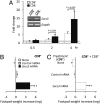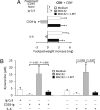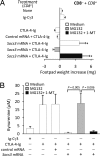SOCS3 drives proteasomal degradation of indoleamine 2,3-dioxygenase (IDO) and antagonizes IDO-dependent tolerogenesis
- PMID: 19088199
- PMCID: PMC2634889
- DOI: 10.1073/pnas.0810278105
SOCS3 drives proteasomal degradation of indoleamine 2,3-dioxygenase (IDO) and antagonizes IDO-dependent tolerogenesis
Abstract
Despite their common ability to activate intracellular signaling through CD80/CD86 molecules, cytotoxic T lymphocyte antigen 4 (CTLA-4)-Ig and CD28-Ig bias the downstream response in opposite directions, the latter promoting immunity, and CTLA-4-Ig tolerance, in dendritic cells (DCs) with opposite but flexible programs of antigen presentation. Nevertheless, in the absence of suppressor of cytokine signaling 3 (SOCS3), CD28-Ig-and the associated, dominant IL-6 response-become immunosuppressive and mimic the effect of CTLA-4-Ig, including a high functional expression of the tolerogenic enzyme indoleamine 2,3-dioxygenase (IDO). Here we show that forced SOCS3 expression antagonized CTLA-4-Ig activity in a proteasome-dependent fashion. Unrecognized by previous studies, IDO appeared to possess two tyrosine residues within two distinct putative immunoreceptor tyrosine-based inhibitory motifs, VPY(115)CEL and LLY(253)EGV. We found that SOCS3-known to interact with phosphotyrosine-containing peptides and be selectively induced by CD28-Ig/IL-6-would bind IDO and target the IDO/SOCS3 complex for ubiquitination and subsequent proteasomal degradation. This event accounted for the ability of CD28-Ig and IL-6 to convert otherwise tolerogenic, IDO-competent DCs into immunogenic cells. Thus onset of immunity in response to antigen within an early inflammatory context requires that IDO be degraded in tolerogenic DCs. In addition to identifying SOCS3 as a candidate signature for mouse DC subsets programmed to direct immunity, this study demonstrates that IDO undergoes regulatory proteolysis in response to immunogenic stimuli.
Conflict of interest statement
The authors declare no conflict of interest.
Figures







References
-
- Shortman K, Naik SH. Steady-state and inflammatory dendritic-cell development. Nat Rev Immunol. 2007;7:19–30. - PubMed
-
- Trinchieri G, Sher A. Cooperation of Toll-like receptor signals in innate immune defence. Nat Rev Immunol. 2007;7:179–190. - PubMed
-
- Grohmann U, et al. Functional plasticity of dendritic cell subsets as mediated by CD40 versus B7 activation. J Immunol. 2003;171:2581–2587. - PubMed
-
- Grohmann U, et al. CTLA-4-Ig regulates tryptophan catabolism in vivo. Nat Immunol. 2002;3:1097–1101. - PubMed
-
- Fallarino F, et al. Modulation of tryptophan catabolism by regulatory T cells. Nat Immunol. 2003;4:1206–1212. - PubMed
Publication types
MeSH terms
Substances
LinkOut - more resources
Full Text Sources
Other Literature Sources
Research Materials

